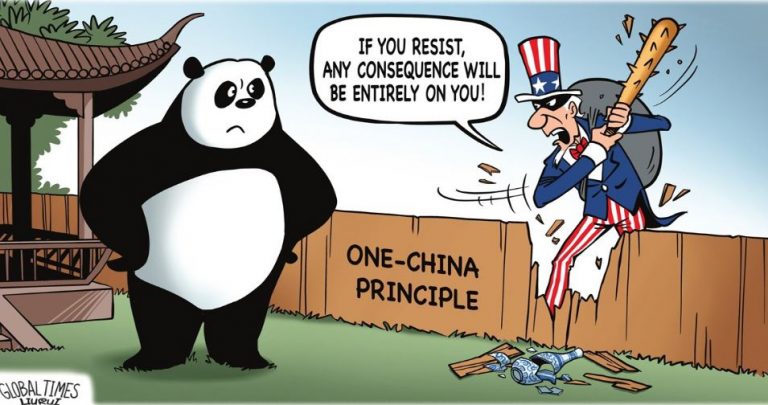
By Zhong Sheng, People’s Daily
The United States has a longstanding practice of exerting frequent long-arm jurisdiction over other countries. In recent years, the practice has kept expanding in scope, with U.S. “arms” stretching longer and longer.
The U.S. abuses long-arm jurisdiction and takes it as a tool to plunder geopolitical and economic interests and maintain its hegemony. The practice not only disregards other countries’ sovereignty, blatantly meddles in others’ internal affairs, seriously damages the legitimate interests of other countries, but also severely erodes the multilateral international order with the United Nations (UN) at its core.
In essence, long-arm jurisdiction is an arbitrary judicial practice, wielded by the U.S. government on the strength of its national power and financial hegemony, to enforce extraterritorial jurisdiction over entities and individuals of other countries on the ground of its domestic law.
The U.S. has gradually developed a massive, mutually reinforcing and interlocking legal system for long-arm jurisdiction, and continued to lower the threshold and expand its discretionary power, thus shaping long-arm jurisdiction into a tool for the U.S. to advance hegemonic diplomacy and pursue economic interests.
The United States is the only sanctions superpower in the world. Statistics show that the previous U.S. administration had imposed over 3,900 sanction measures, which means it wielded its “big stick” three times a day on average. By the fiscal year 2021, the number of active U.S. sanctions designations had increased to more than 9,400.
U.S. long-arm jurisdiction strains relations between countries and undermines the international order. The country has extended its punitive legislation to the whole world since the mid-1990s, said French author Ali Laïdi in his book.
The U.S. introduced the Helms-Burton Act to impose economic sanctions through long-arm jurisdiction on individuals and entities worldwide conducting transactions with Cuba, rolled out the D’Amato Act which forbids foreign companies from investing in the energy sector of Iran and Libya, and implemented the “Trading with the Enemy Act” to expand sanctions on Russia, DPRK, and Iran.
The U.S. always forces its own wills and standards on others, replacing widely-accepted international laws and rules with its domestic laws.
Out of the strong dissatisfaction with U.S. long-arm jurisdiction, the European Union put forward a series of proposals and initiatives at the UN General Assembly, the Security Council, the World Trade Organization, and other international bodies, calling on the international community to pay attention to the harmful effects of U.S. long-arm jurisdiction, and even resorted to the WTO dispute settlement procedures.
U.S. long-arm jurisdiction undermines the purposes and functions of various international governance mechanisms.
The U.S. has frequently imposed unilateral sanctions outside the UN framework. As a result, the sanctioning function of the Security Council is undercut, seriously affecting its normal function of maintaining international peace and security.
Despite the ruling of the Dispute Settlement Body of WTO that its Section 301 procedures are a violation of international law, the United States continues to launch various unilateral Section 301 investigations on imports from China and other countries, and keeps all existing Section 301 tariffs unchanged. It has blatantly trampled on the purposes and spirit of the multilateral trading system and eroded the cornerstone of the system’s operation.
The U.S., wielding the stick of long-arm jurisdiction, has become an expert in unilateralism and bullying, a saboteur of the multilateral trading system, and a manipulator applying double standards in industrial policies.
U.S. long-arm jurisdiction suppresses business competitors and undermines the interests of companies in other countries.
It abuses its public power to suppress competitors and meddle in normal international business activities, which marks a complete departure from its long-standing self-proclaimed champion of liberal market economy.
the The U.S. applied the Foreign Corrupt Practices Act and other domestic laws in other countries, imposing astronomical fines on multiple industrial leaders in Europe, which crippled the competitiveness of European industry.
Enterprises from America’s allies, such as Japan’s Toshiba, Siemens in Germany, and French company Alstom were all once targets of U.S. “acts of piracy.”
A report said that U.S. long-arm jurisdiction has become a real industry, a weapon that the country uses to weaken foreign competitors in economic wars.
U.S. long-arm jurisdiction violates the basic human rights of citizens in other countries.
In recent years, the U.S. has frequently employed the Global Magnitsky Human Rights Accountability Act (2016) to impose unilateral sanctions on entities in various countries deemed to have engaged in “serious human rights violations.” However, it has often violated the basic human rights of the sanctioned subjects while exercising such unilateral sanctions.
Nadia Helmy, a political science professor at Egypt’s Beni-Suef University, noted that U.S. sanctions imposed on Afghanistan, Iran, Syria, Yemen, and other countries have not only failed to reach its goal of economic coercion, but also seriously disturbed the COVID-19 responses in these countries.
As the Brookings Institution estimated, during the height of the pandemic in Iran, U.S. sanctions further exacerbated the spread of the virus and could have caused up to 13,000 of deaths.
Today’s world is facing uncertainties and instabilities and needs countries to forge solidarity. The U.S. should renounce its illegal unilateral sanctions and long-arm jurisdiction measures, truly take up its international responsibilities as a major country, and work with other counties to safeguard international equity and justice, and promote the peaceful development of the world.
(Zhong Sheng is a pen name often used by People’s Daily to express its views on foreign policy and international affairs.)










